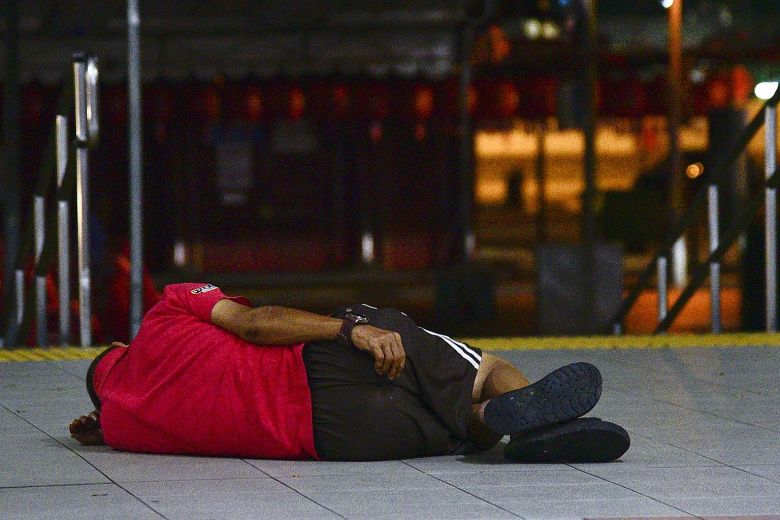TL;DR – It’s possible, but it takes a village. And then some.

There were a number of articles about poverty and homelessness in mainstream media in mid-October. That’s because October 17 was the International Day for the Eradication of Poverty. It was declared 25 years ago by the United Nations General Assembly.
Yes, there are poor people in Singapore
What has that got to do with Singapore? Does Singapore even have poor people? Yes. We do. And yes, there are also people who ask whether there are poor people in Singapore. Not only are there poor people in Singapore, we also have homeless people too.
On average, the Ministry of Social and Family Development (MSF) assists about 300 homeless people. That’s not a huge number, but one can say that even one homeless person is one too many. Another recent count by a group of social workers and volunteers put the number at 180.
What’s more worrying is that most of them have jobs. Some even have full time jobs as security officers, cleaners and others.
Yes, some are homeless but definitely not bums. And yet some are living on the streets, but they’re not exactly homeless.
Not enough to tell them to change their mindsets
And that is what’s of greater concern. That a significant number of those who are poor in Singapore are considered the working poor. They aren’t lazy, they aren’t just sitting around living off government benefits. They work full-time, they slog, yet, they are not able to make ends meet.
It’s not as if they don’t think “I can do this. I must try”. Many of them do.
Unfortunately, as Associate Professor Teo You Yenn, Head of Sociology at NTU, pointed out, “feelings of empowerment are an outcome of actual ownership of power, not the cause”.
She said:
“But if one lacks actual power-control over time; bargaining power with employers, teachers, social workers, landlords, creditors; voice to get one’s interests represented in social policies – merely changing how one thinks about oneself will not change these realities. The notions of “empowerment” and “choice” are useless when people do not have genuine options.”
Professor Teo recounted often meeting children who were immediately marked as falling behind as they entered Primary 1. These children are often from lower income families, where parents aren’t able to help with homework or pay for tuition. This contrasted with children from families that are more well-off, who are not only able to help with homework, pay for tuition, but also able to shuttle their children from one enrichment activity to another.

So what can be done?
Prof Teo suggested that one reason that poverty and inequality get passed from one generation to the next is because of our education system. She said:
“Our education system searches for and rewards precocity. Centring on high-stakes exams, it defines merit narrowly, and it leads those who can afford it to try to acquire certain qualities through the private shadow education market. This creates a high-pressure environment for adults and children of all class backgrounds. For parents and children from low-income households, in particular, the outcome is to be made to feel perpetually like failures.”
So perhaps one of the things that needs to be done is to change our education system. Move away from high-stakes exams, and define merit more broadly.

In addition to changes in the education system, the government potentially can alleviate most problems of absolute poverty.
According to Mr Yeoh Lam Keong, former chief economist of GIC, that can be achieved by “raising the Workfare Income Supplement ( WIS) and Silver Support Scheme by $600 in cash per month at a total cost of significantly less than 1 % of GDP. This is a fiscal cost which we can well afford without even raising taxes!”
What does alleviating the problems of absolute poverty mean for families with lower income?
It means they don’t have to worry about their basic needs any more. That leaves them with more capacity to think about things like upgrading themselves, and providing better education for their children.
That would be truly empowering.
But wouldn’t that lead to waste?
Because there are people who are poor only because they lead wasteful lives. They don’t work, they smoke, they drink.
Like the case that Speaker Tan Chuan-Jin pointed out in a Facebook post. At one of his MPS, a resident complained about him helping residents who are taking advantage of his assistance. The resident said they gambled, drank, smoked, sold our NTUC vouchers for cash, sold the groceries we provided them etc etc.
Speaker Tan knows that some times, despite his best effort, he gets “conned”. It’s “frightfully difficult”. It needs a lot of asking and checking. And when he finds out that people don’t really need the help, then he scales back and tries to be tighter with the assistance. But, he emphasized, “when in doubt, help first”.
Perhaps that should be our default attitude.
Help first.
Assume that most Singaporeans will only seek financial assistance if they really need it. Assume that most Singaporeans won’t cheat the system. Assume that Singaporeans won’t suddenly turn into leeches and loafers just because of a better, stronger social safety net. Assume that the Singaporeans who benefit from the help will pay it forwards when they improve their lot in life.
So the next time you see someone in need, call the ComCare hotline (1800 222-0000), or advise the person to approach the nearest Social Service Office or Family Service Centre.
